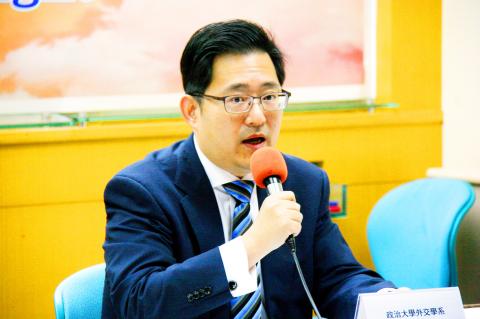President Tsai Ing-wen’s (蔡英文) administration should exercise caution in its handling of a proposed anti-infiltration bill, academics said yesterday, adding that such legislation should not be hastily implemented, considering the maturity of Taiwan’s democracy.
“While the president has said that there is room for discussion regarding the bill, there really is not,” Tamkang University Institute of International Affairs and Strategic Studies associate professor Li Da-jung (李大中) said at the seminar hosted by the Association of Strategic Foresight in Taipei.
The definition for “infiltration” could vary significantly and might be interpreted in various ways, which could usher in a chilling effect and undermine protection for human rights, he said.

Photo: CNA
Such legislation is detrimental not only to cross-strait relations, but also to human rights, he added.
“At this point in our democracy, this kind of law should not be hastily implemented, as it would only lead to further polarization of the public,” Li said.
The US has yet to make its opinion on the bill known, because it is still being reviewed, but that does not mean that its passage would strengthen US-Taiwan relations and mutual trust, National Chengchi University Department of Diplomacy associate professor Lu Yeh-chung (盧業中) said.
“On the topic of the bill, McCarthyism and its resultant effects must also be considered,” Lu said, adding that whether the bill would truly be able to protect democracy and freedom of speech should be further debated.
Separately, the Legislative Yuan issued a notice to convene all legislative caucuses at 2pm today to review matters pertaining to the bill.
Officials from the Ministry of the Interior, the Mainland Affairs Council, the Central Election Commission, the Ministry of Justice and the National Security Bureau have been invited to the meeting.
Democratic Progressive Party (DPP) caucus whip Ker Chien-ming (柯建銘) said on Facebook that he hoped the caucuses could rationally debate the issue.
The DPP’s version of the bill has been amended three times, in accordance with public opinion, showing that the party cares about what the public thinks, DPP Legislator Wang Ting-yu (王定宇) said.
On the other hand, the Chinese Nationalist Party (KMT) has refused to discuss the issue since the DPP broached the subject on May 31, Wang said, adding that it was the KMT that has shut down channels of communication.
The bill clearly defines contraventions as accepting money from foreign or enemy forces; campaigning, holding a referendum or lobbying for them; and disrupting gatherings or processions on their behalf, he said.
The KMT, as a mature political party, should resume negotiations and read the draft legislation, instead of being afraid over nothing, he added.

Alain Robert, known as the "French Spider-Man," praised Alex Honnold as exceptionally well-prepared after the US climber completed a free solo ascent of Taipei 101 yesterday. Robert said Honnold's ascent of the 508m-tall skyscraper in just more than one-and-a-half hours without using safety ropes or equipment was a remarkable achievement. "This is my life," he said in an interview conducted in French, adding that he liked the feeling of being "on the edge of danger." The 63-year-old Frenchman climbed Taipei 101 using ropes in December 2004, taking about four hours to reach the top. On a one-to-10 scale of difficulty, Robert said Taipei 101

A preclearance service to facilitate entry for people traveling to select airports in Japan would be available from Thursday next week to Feb. 25 at Taiwan Taoyuan International Airport, Taoyuan International Airport Corp (TIAC) said on Tuesday. The service was first made available to Taiwanese travelers throughout the winter vacation of 2024 and during the Lunar New Year holiday. In addition to flights to the Japanese cities of Hakodate, Asahikawa, Akita, Sendai, Niigata, Okayama, Takamatsu, Kumamoto and Kagoshima, the service would be available to travelers to Kobe and Oita. The service can be accessed by passengers of 15 flight routes operated by

Taiwanese and US defense groups are collaborating to introduce deployable, semi-autonomous manufacturing systems for drones and components in a boost to the nation’s supply chain resilience. Taiwan’s G-Tech Optroelectronics Corp subsidiary GTOC and the US’ Aerkomm Inc on Friday announced an agreement with fellow US-based Firestorm Lab to adopt the latter’s xCell, a technology featuring 3D printers fitted in 6.1m container units. The systems enable aerial platforms and parts to be produced in high volumes from dispersed nodes capable of rapid redeployment, to minimize the risk of enemy strikes and to meet field requirements, they said. Firestorm chief technology officer Ian Muceus said

MORE FALL: An investigation into one of Xi’s key cronies, part of a broader ‘anti-corruption’ drive, indicates that he might have a deep distrust in the military, an expert said China’s latest military purge underscores systemic risks in its shift from collective leadership to sole rule under Chinese President Xi Jinping (習近平), and could disrupt its chain of command and military capabilities, a national security official said yesterday. If decisionmaking within the Chinese Communist Party has become “irrational” under one-man rule, the Taiwan Strait and the regional situation must be approached with extreme caution, given unforeseen risks, they added. The anonymous official made the remarks as China’s Central Military Commission Vice Chairman Zhang Youxia (張又俠) and Joint Staff Department Chief of Staff Liu Zhenli (劉振立) were reportedly being investigated for suspected “serious